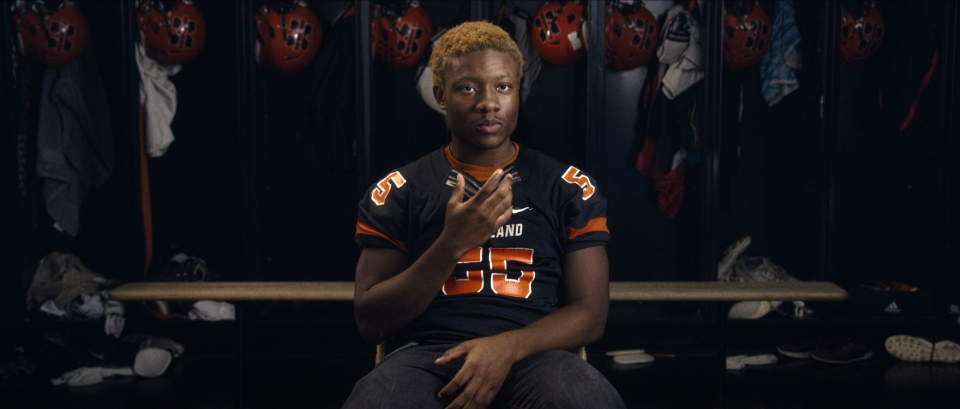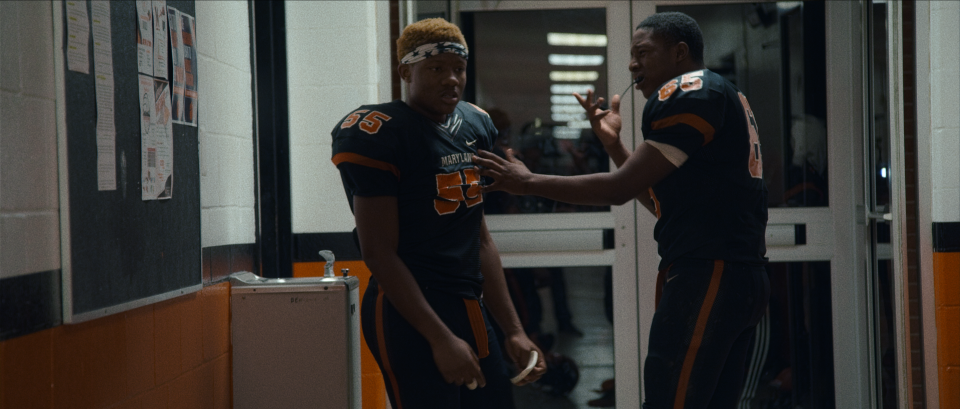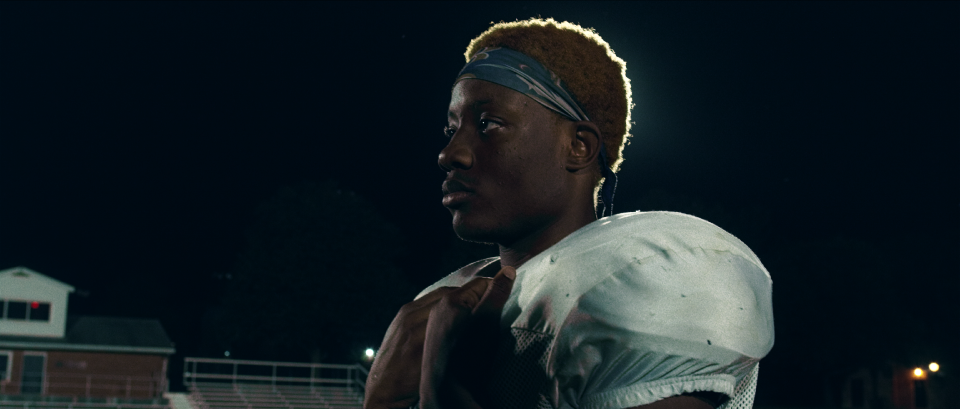‘CODA’s Troy Kotsur An Inspiration To Deaf Stars Of Oscar-Nominated Doc ‘Audible’
- Oops!Something went wrong.Please try again later.
- Oops!Something went wrong.Please try again later.

Deaf representation has taken a major step forward with two Oscar-nominated films this year — one a fictional story, the other entirely real.
Best Picture contender CODA stars Oscar-nominated deaf actor Troy Kotsur as a father who is deaf, and whose daughter is hearing and known as a CODA, or ‘child of deaf adults’. Meanwhile, in the short documentary category, Oscar nominee Audible tells the story of three high school seniors at the Maryland School for the Deaf. They, like Kotsur, grew up deaf in a society that often shunts to the side those without hearing.
More from Deadline
Online Oscar Voting Seems To Work. Why Not Add Some Policy Questions?
Oscar Street Closures Set For Red Carpet, Telecast, More - Here Are The Maps
Deadline got Kotsur and Audible stars Amaree McKenstry-Hall, Lera Walkup, and Jazie Perry together recently for a video conference call where they shared how moved they were by each other’s films. During the call Kotsur placed his hand on his chest, telling the young people, “When I saw Audible, it hit me hard. It hit me straight in the heart.”
In Audible, directed by Matt Ogens, McKenstry-Hall finds an outlet playing football with fellow deaf classmates on a talented MSD team. But at home, he struggles at times as the only deaf person in his family.
Kotsur, 53, said watching Audible reminded him of when he was younger. “I grew up in a hearing family myself and, really, we didn’t have much communication at times.”

AUDIBLE/NETFLIX
Kotsur recently won the supporting actor SAG Award for his CODA role as fisherman Frank Rossi, who comes to understand the dreams of his daughter Ruby, played by Emilia Jones. The CODA cast, including fellow deaf actors Marlee Matlin and Daniel Durant, and hearing actors Jones, Eugenio Derbez and Ferdia Walsh-Peelo, also won the SAG Award for Best Ensemble.
In February, Kotsur became the first deaf male actor to earn an Academy Award nomination (Matlin, in 1987, became the first deaf performer ever nominated, going on to win the Oscar for Children of a Lesser God). Kotsur’s breakthrough carries a lot of significance for the cast of Audible.
On the conference call, Walkup told Kotsur, “Your achievement of getting the [nomination] is really amazing for you but also, as a deaf person, you’re showing that our community, our Deaf community, is really huge and you represent a lot of us.”
“We’re really just touched and thrilled to know that we fought so hard to be in these spaces and different environments,” Perry added, “whether it be as actors in movies, and now that we’re finally getting the awards, and accolades and recognition, it’s really amazing to see Troy’s accomplishment happen and hopefully we’ll see more, other people behind him, whether it’s me, Amaree or Lera, following behind in his footsteps.”
Kotsur’s performance in CODA resonated with the Audible stars in multiple ways.
“Seeing Troy’s character kind of hit home for me because my mother is deaf and I do have two hearing siblings,” Perry said. “I saw a lot of similarities to my siblings, what they went through in the hearing world, but also how they navigate in a deaf world. Just the parents [in CODA], how they interacted with their daughter, felt like home to me.”
Perry says she aspires to become the first African American, trans, deaf actress. She wanted to know how Kotsur got into Hollywood.
“How did your journey begin?” she asked. “How’d you get successful in it?”
“When I was younger, I was like you and I was thinking about, ‘Where do I get started?’” Kotsur responded. “I was looking for a place that would be friendly and have access for me. And so, I found Deaf West Theatre [in Los Angeles]. I was acting for many years, in many productions. How I got into CODA was because our director, Siân Heder, had seen me perform on stage at Deaf West Theatre four years before I auditioned for the role, but I actually didn’t know that [until later]… I did a lot of plays and remaining persistent was how I did it. I didn’t know how much time it would take.”

AUDIBLE/NETFLIX
Now he wants to pay his success forward to a new generation.
“I would love to establish a workshop for young deaf students to train as actors, a training ground for TV, film and stage,” Kotsur said. “I’m actually looking for the financing now to do it. That’s actually my dream to establish that workshop.”
And Perry sounds like an excellent candidate for the program.
“I just like getting out of myself and being able to put on a different character, get out of the reality I’m in, and enter another world,” she said. “That’s kind of how my interest for acting came up.”
Walkup and McKenstry-Hall said they too have entertained the notion of getting into acting, and given the presence they display on screen in Audible, they seem to possess that intangible ‘it’ factor.
“A lot of my [social media] followers have reached out to me, and said I should go to Hollywood, pursue Hollywood, but I didn’t know what that journey would look like,” McKenstry-Hall said. “Me being young, I’m 20, I have plenty of time, right?”
“Yes. You have plenty of time,” Kotsur said.
Walkup, a sophomore this year at Gallaudet University in Washington, D.C. (a school Kotsur also attended), said she “wouldn’t mind entering the theater department”.
“So, when you feel comfortable, when you feel ready, have that experience and see if you’re motivated and interested to dive in,” Kotsur told her. “And if it’s not your thing, you might want to go into something else, maybe writing or directing. You have to really search and look within. I had the opportunity to direct, write and act, and I didn’t want to feel limited. I wanted to be a multi-hyphenate and wear many different hats… Stretch yourself and don’t have any boundaries and feel free to express yourself. It’s really important for you all to experience a bit of all these different worlds.”
Kotsur revealed he had more in common with McKenstry-Hall than appearing in Oscar-nominated films. Back in the day, he too played football.
“I was the only deaf member of a hearing football team, and I played center,” he said.
Audible shows how a big bass drum is used to start each play as Amaree and his teammates compete on the field. The sound waves reverberate through the ground, reaching each players’ feet. Troy, as the lone deaf player on his football squad, didn’t benefit from a bass drum, so he came up with a work around.
“You know how they hike the ball, how the quarterback would signal me to hike is he would actually tap me on the butt, or on the cup,” he explained to the Audible trio. “That was the signal we developed.”

AUDIBLE/METFLIX
He recalled, “I’ll never forget this one time our quarterback was injured and was replaced by a second-string quarterback. He forgot that I was deaf. So, he didn’t tap me to hike the ball. And so, all of a sudden, he just got blitzed. I was like, ‘Hey, you’ve got to tap me on the butt.’ He did feel uncomfortable doing that, but he goes, ‘OK.’ So, when we were at the line of scrimmage again, again he got blitzed and I was like, ‘Listen, I didn’t feel the tap. I have pads back there. You’ve got to hit me harder so I can feel it.’ It was a bit weird for him. That’s how we communicated. That was the system we established. We were actually 10 wins and two losses on our JV team.”
Kotsur and the Audible young people may get a chance to meet up next—not on the gridiron, but the Oscar red carpet. If it happens, Audible’s stars said they want a selfie with Kotsur.
“Oh, definitely,” Kotsur promised.
Perry asked him how it felt to win that solo SAG award.
“I felt like Hollywood finally recognized me and recognized deaf talent and deaf actors. It seemed like they’re now willing to accept us, and they believed in my work and validated my work. They didn’t look at me like, ‘Oh, poor deaf person.’ They looked at me as a peer, as an actor who just happened to be deaf. And so, I see Hollywood beginning to open their minds and accept us as deaf actors.”
Kotsur commented on the significance of an Oscar year where two nominated films—a fictional one and a nonfiction one—explore the lives and experience of deaf people.
“Often we were marginalized, we were ignored,” he said. “But we have such a rich history of storytelling in the Deaf community… I think Hollywood is starting to wake up and open their eyes, and they’re opening their hearts and minds, and they’re more willing to work with deaf actors in stage or TV or film.”
He urged not just Hollywood, but other segments of society to really push much further, and think about innovative ways to foster a more inclusive world where deaf people can fully participate.
“There’s no limits to creativity,” Kotsur said. “Today, we have great technology with smartphones. You could develop a robotic technology that would be ‘signed-to-voice recognition,’ or some new type of futuristic technology. Let’s begin to think outside the box and let’s collapse that box and let’s spread opportunities to deaf talent.”
Best of Deadline
What's New On HBO Max For March 2022: Day-By-Day Listings For TV Shows & Movies
New On Netflix For March 2022: Day-By-Day Listings For TV Series, Movies & More
Sign up for Deadline's Newsletter. For the latest news, follow us on Facebook, Twitter, and Instagram.

